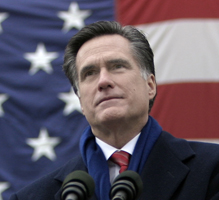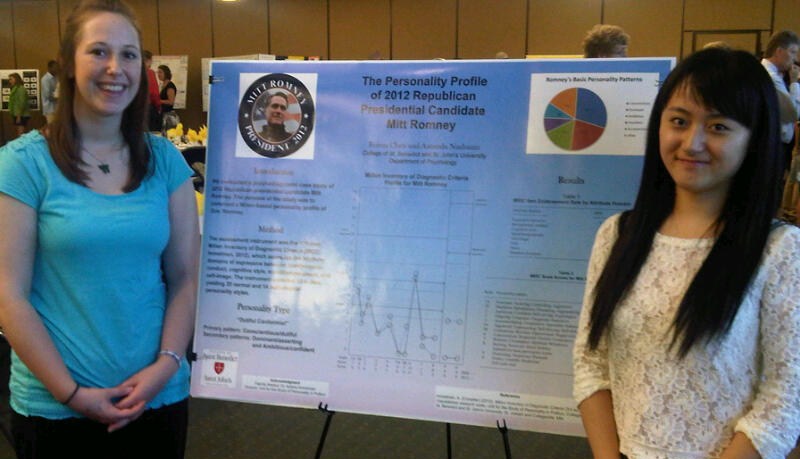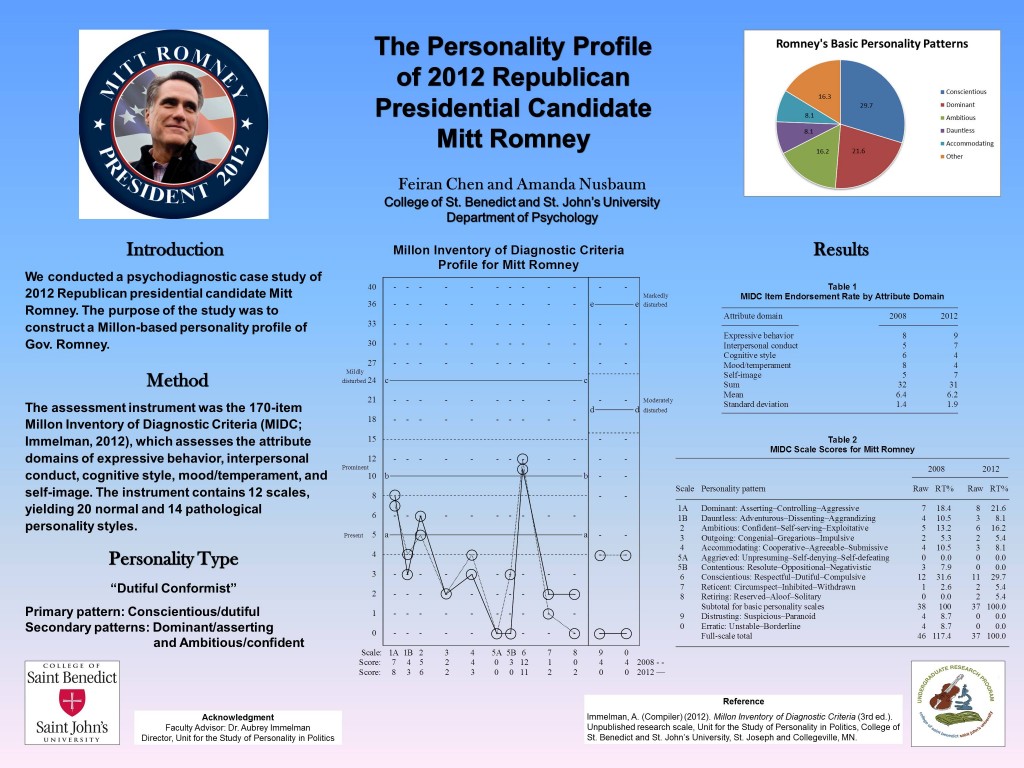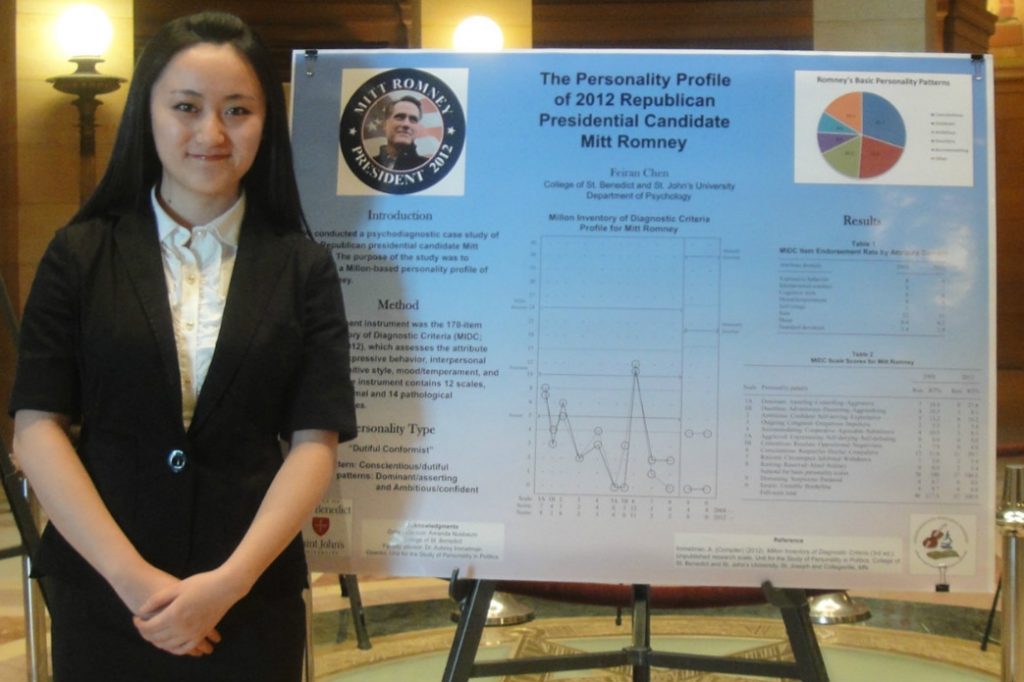Featured Posts

- Index of Psychological Studies of Presidents and Other Leaders Conducted at the Unit for the Study of Personality in Politics
- The Personality Profile of U.S. Supreme Court Associate Justice Brett Kavanaugh
- The Leadership Style of North Korean Leader Kim Jong-un
- North Korea Threat Assessment: The Psychological Profile of Kim Jong-un
- Russia Threat Assessment: Psychological Profile of Vladimir Putin
- The Personality Profile of 2016 Republican Presidential Candidate Donald Trump
- Donald Trump's Narcissism Is Not the Main Issue
- New Website on the Psychology of Politics
- Unit for the Study of Personality in Politics --- 'Media Tipsheet'
categories

- Afghanistan (228)
- Al Gore (2)
- Amy Klobuchar (4)
- Ayman al-Zawahiri (7)
- Barack Obama (60)
- Ben Carson (2)
- Bernie Sanders (7)
- Beto O'Rourke (3)
- Bill Clinton (4)
- Bob Dole (2)
- Campaign log (109)
- Chris Christie (2)
- Chuck Hagel (7)
- Criminal profiles (8)
- Dick Cheney (11)
- Domestic resistance movements (21)
- Donald Trump (31)
- Economy (33)
- Elizabeth Warren (4)
- Environment (24)
- George H. W. Bush (1)
- George W. Bush (21)
- Hillary Clinton (9)
- Immigration (39)
- Iran (43)
- Iraq (258)
- Jeb Bush (3)
- Joe Biden (13)
- John Edwards (2)
- John Kasich (2)
- John Kerry (1)
- John McCain (7)
- Kamala Harris (5)
- Kim Jong-il (3)
- Kim Jong-un (11)
- Law enforcement (25)
- Libya (18)
- Mahmoud Ahmadinejad (6)
- Marco Rubio (2)
- Michael Bloomberg (1)
- Michele Bachmann (173)
- Mike Pence (3)
- Military casualties (234)
- Missing person cases (37)
- Mitt Romney (13)
- Muqtada al-Sadr (10)
- Muslim Brotherhood (6)
- National security (16)
- Nelson Mandela (4)
- News (5)
- North Korea (36)
- Osama bin Laden (19)
- Pakistan (49)
- Personal log (25)
- Pete Buttigieg (4)
- Presidential candidates (19)
- Religious persecution (11)
- Rick Perry (3)
- Rick Santorum (2)
- Robert Mugabe (2)
- Rudy Giuliani (4)
- Russia (7)
- Sarah Palin (7)
- Scott Walker (2)
- Somalia (20)
- Supreme Court (4)
- Syria (5)
- Ted Cruz (4)
- Terrorism (65)
- Tim Pawlenty (8)
- Tom Horner (14)
- Tributes (40)
- Uncategorized (50)
- Vladimir Putin (4)
- Xi Jinping (2)
- Yemen (24)
Links

archives

- November 2021
- January 2021
- November 2020
- October 2020
- September 2020
- August 2020
- July 2020
- April 2020
- March 2020
- February 2020
- January 2020
- December 2019
- October 2019
- July 2019
- May 2019
- April 2019
- March 2019
- February 2019
- January 2019
- December 2018
- September 2018
- August 2018
- July 2018
- June 2018
- April 2018
- March 2018
- February 2018
- January 2018
- August 2017
- July 2017
- June 2017
- May 2017
- April 2017
- February 2017
- January 2017
- December 2016
- November 2016
- October 2016
- September 2016
- August 2016
- July 2016
- June 2016
- May 2016
- April 2016
- March 2016
- February 2016
- January 2016
- December 2015
- November 2015
- October 2015
- September 2015
- August 2015
- July 2015
- June 2015
- May 2015
- April 2015
- March 2015
- February 2015
- January 2015
- December 2014
- November 2014
- October 2014
- September 2014
- August 2014
- July 2014
- June 2014
- May 2014
- April 2014
- March 2014
- February 2014
- January 2014
- December 2013
- November 2013
- October 2013
- September 2013
- August 2013
- July 2013
- June 2013
- May 2013
- April 2013
- March 2013
- February 2013
- January 2013
- December 2012
- November 2012
- October 2012
- September 2012
- August 2012
- July 2012
- June 2012
- May 2012
- April 2012
- March 2012
- February 2012
- January 2012
- December 2011
- November 2011
- October 2011
- September 2011
- August 2011
- July 2011
- June 2011
- May 2011
- April 2011
- March 2011
- February 2011
- January 2011
- December 2010
- November 2010
- October 2010
- September 2010
- August 2010
- July 2010
- June 2010
- May 2010
- April 2010
- March 2010
- February 2010
- January 2010
- December 2009
- November 2009
- October 2009
- September 2009
- August 2009
- July 2009
- June 2009
- May 2009
- April 2009
- March 2009
- February 2009
- January 2009
- December 2008
- November 2008
- October 2008
- September 2008
- August 2008
- July 2008
meta

A psychological analysis of former Massachusetts governor Mitt Romney, conducted in fall 2007 by Julie Seifert, Mick Lundstrum, and Aubrey Immelman, Ph.D., at the Unit for the Study of Personality in Politics revealed that Romney’s primary personality pattern is Conscientious-dutiful, with secondary features of the Dominant-asserting and Ambitious-confident patterns.
Following is a political-psychological analysis based on the 2007 study.
Dutiful Romney Continues Struggle for Votes

By Mick Lundstrum and Aubrey Immelman
Unit for the Study of Personality in Politics
January 11, 2008
Mitt Romney, the presidential candidate better known for his Mormon faith than for his policy positions, has been dogged by obstacles and setbacks on the campaign trail. In Iowa, where he had dumped nearly three-fifths of his campaign expenditure, he was blindsided by the come-from-nowhere Huckabee juggernaut. In New Hampshire, he was bested by a resuscitated back-from-the-dead McCain campaign.
By all appearances, Gov. Romney is an attractive candidate. He looks “presidential,†is well financed, and has a strong track record in business and government. Yet, despite an MBA and law degree from Harvard, a successful business career as management consultant and venture capitalist, president and CEO of the 2002 Salt Lake Winter Olympics Organizing Committee, governor of Massachusetts, and chair of the Republican Governors’ Association, Romney has found little traction with Republican voters.
So, how do we account for Romney’s floundering campaign for Republican support?
Some have pointed to Romney’s Mormon beliefs, viewed with suspicion by elements of the Christian Evangelical Republican base. Others have pointed to his “flip-flop†on abortion. Another consideration, which has not received much air time in the media or in print, is Romney’s personality — those aspects of his typical modes of thinking, acting, and relating to others that remain relatively consistent over time and across situations.
For insight into this aspect Romney’s character, we generated a personality profile using a standard assessment procedure developed at the Unit for the Study of Personality in Politics at the College of St. Benedict and St. John’s University in Minnesota. This is what we found.
Conscientious
Perhaps not surprising for someone with Romney’s academic and professional credentials, he emerged from the assessment as a highly conscientiousness personality. What is remarkable, however, is that few candidates for president can claim conscientiousness as a prominent trait — in the past several elections cycles, an exclusive club of losing candidates consisting of Michael Dukakis, Bob Dole, Steve Forbes, Bill Bradley, and Al Gore.
People with Romney’s levels of conscientiousness are best described as “dutiful.†They are characteristically proper and dignified, dependable, and principled (though the latter trait is somewhat at variance with perceptions of Romney as a flip-flopper).
Above all, they are highly organized, which accounts for Romney’s roaring success in organizational and corporate management and financial restructuring. Dutiful and diligent, and adept at getting the job done without letting work accumulate, conscientious leaders are movers and shakers who are at the top of their game when making and implementing policy.
On the downside, conscientious persons can be rigid thinkers with a closed-minded tendency; as leaders, they are technocratic rather than visionary. For that reason, in high political office they may be better suited to the role of assistant to the chief executive — perhaps as vice president, cabinet secretary, or chief of staff.
With their attention to detail, their work ethic, and their prudence, conscientious persons are potentially good leaders; however, in the United States they usually have trouble attaining high-level political office, because of the difficulty they have connecting with voters and the media.
Dominant
Like many politicians who strive for higher political office, Romney also has a pronounced dominant tendency — though not nearly as pervasive as the aggressive dominance of a Rudy Giuliani or the self-assertive boldness of a John McCain. Instead, it would be more accurate to describe Romney as merely assertive, strong-willed, and goal-directed.
Some aspects of Romney’s dominance reinforce his fundamental conscientious tendency — most notably his strong work ethic, proneness to cognitive inflexibility, and obstinacy, which suggests he may stay in the race longer than he remains a viable candidate. That said, leaders like Romney, with moderate levels of conscientiousness and dominance, generally are effective, deliberative leaders who make informed decisions and get things done.
In terms of his experience and psychological profile, Romney may be one of the better candidates for president, but as recent presidential election history has shown, he does not fit the profile of a successful presidential candidate.
Next Tuesday’s Republican primary in Michigan — where native son Mitt Romney has the rare advantage of contesting an early-primary state where his father once served as governor — will be the acid test for whether that particular chapter in U.S. election history repeats itself.
Note. A slightly revised version of this article was published as the “Your Turn” column Romney is conscientious and assertive in the St. Cloud Times (p. 5B), Jan. 15, 2008.
Follow-up study

Research assistants Amanda Nusbaum and Feiran Chen presented their summer research project on “The Personality Profile of 2012 Republican Presidential Candidate Mitt Romney†at the College of St. Benedict in St. Joseph, Minn., July 30, 2012. The research was conducted under the auspices of the Unit for the Study of Personality in Politics, directed by College of St. Benedict / St. John’s University associate professor of psychology Aubrey Immelman, Ph.D.
The Political Personality of 2012 Republican Presidential Candidate
Mitt Romney
Aubrey Immelman
Abstract
This paper presents the results of an indirect assessment of the personality of Willard Mitt Romney, Republican presidential candidate in the 2008 U.S. presidential election and Republican presidential nominee in 2012.
The study was conducted in 2007–2008 and 2012, from the conceptual perspective of personologist Theodore Millon. Information concerning Romney was collected from biographical sources and media reports and synthesized into a personality profile using the Millon Inventory of Diagnostic Criteria (MIDC), which yields 34 normal and maladaptive personality classifications congruent with Axis II of DSM-IV.
The personality profile yielded by the MIDC was analyzed on the basis of interpretive guidelines provided in the MIDC and Millon Index of Personality Styles manuals. Romney’s primary personality pattern was found to be Conscientious/dutiful, complemented by secondary Dominant/asserting, Ambitious/confident, and Accommodating/cooperative features and a minor Retiring/reserved tendency.
In the absence of other primary personality patterns that might serve to modify or offset high conscientiousness, Romney’s is best described as a dutiful conformist. Leaders with this personality profile are characteristically prudent, proper, dignified, dependable, and more principled than most personality types. They are highly organized, with a strong work ethic and careful attention to detail, which accounts in part for Romney’s resounding success in organizational and corporate management and financial restructuring.
Dutiful and diligent, conscientious leaders excel in crafting public policy. On the downside, conscientious leaders often lack the retail political skills required to consummate their policy objectives. In short, they are more technocratic than visionary. Furthermore, in American politics, conscientious leaders lacking in extraversion face serious challenges in attaining high-level public office, because of their difficulty in connecting emotionally with voters and the media.
The major implication of the study is that it offers an empirically based personological framework for identifying Romney’s major personal limitations as a candidate and anticipating his likely leadership style as president.
Full research report
The Political Personality of 2012 Republican Presidential Candidate Mitt Romney. Paper presented at the 35th Annual Scientific Meeting of the International Society of Political Psychology, Chicago, July 6–9, 2012. Abstract and link for full-text (35 pages; PDF) download at Digital Commons: http://digitalcommons.csbsju.edu/psychology_pubs/98/
—————————————————
Related reports on this site

Click on image for larger view
Why Mitt Romney Won’t Win (May 12, 2011)
Excerpt: Research conducted at the Unit for the Study of Personality in Politics under the direction of Aubrey Immelman, Ph.D., suggests that Massachusetts’ health law, enacted during Romney’s tenure as governor, may be the least of his problems as he vies for the Republican nomination in a crowded GOP field. Romney lacks the personal charisma to sway non-base voters, as measured by the Personal Electability Index for presidential contenders, developed at the Minnesota-based political psychology research unit.
Obama Campaign Tilting at Romney Windmill (Aug. 9, 2011)
Excerpt: The Obama campaign would be misguided if it diverted inordinate resources to fending off Mitt Romney as Barack Obama’s likely opponent. Despite being the early front-runner in public opinion polls, Romney is unlikely to be the Republican presidential nominee — or, if he is, to be a viable challenger to Barack Obama. … Specifically, Romney’s score of 6 on the Personal Electability Index (PEI), which has accurately predicted the outcome of every presidential election since 1996, ranks near the bottom among presidential candidates I’ve studied in the past four presidential election cycles — slightly lower than John Kerry’s PEI score of 9 (though considerably better than Al Gore’s -17).
Personality Matters: Mitt Romney Has Al Gore Problem (Jan. 16, 2012)
Excerpt: A psychological analysis of former Massachusetts governor Mitt Romney, conducted in fall 2007 by Julie Seifert, Mick Lundstrum, and Aubrey Immelman, Ph.D., at the Unit for the Study of Personality in Politics revealed that Romney’s primary personality pattern is Conscientious/dutiful, with secondary features of the Dominant/asserting and Ambitious/confident patterns — a personality pattern that does not predict presidential electoral success.
Mitt Romney’s Leadership Style (Sept. 3, 2012)
Excerpt: A psychological profile of former Massachusetts governor Mitt Romney, developed at the Unit for the Study of Personality in Politics during Romney’s 2008 and 2012 presidential campaigns, reveals that the Republican nominee is highly conscientious, with a personality type best described as a “dutiful conformist.” Specifically, Romney is primarily a Conscientious-dutiful personality, complemented by secondary Dominant-asserting, Ambitious-confident, and Accommodating-cooperative features and a minor Retiring-reserved tendency. Romney’s personality profile provides a stable framework for anticipating his likely leadership style as president, as outlined in this report of how Romney will govern, if elected.
Why Mitt Romney Won’t Be President — In Theory (Oct. 29, 2012)

Aubrey Immelman and Andrew Obritsch in Chicago at the annual scientific meeting of the International Society of Political Psychology to present their research on Barack Obama and Mitt Romney, July 2012.
Excerpt: A heuristic model developed at the Unit for the Study of Personality in Politics to predict the winner of the presidential election prior to Super Tuesday indicates that Democratic incumbent President Barack Obama will defeat Republican challenger Gov. Mitt Romney in the November 6, 2012 U.S. presidential election.
—————————
Related report
Back from the Dead: Romney to Make 2012 Bid
‘I’ve never seen an enterprise in more desperate need of a turnaround than the U.S. government’
Race for 2012 GOP nomination heats up (NBC “Today,” June 1, 2010) — Former Massachusetts Governor Mitt Romney is to officially announce in New Hampshire that he’s running for president. NBC’s Chuck Todd reports on Romney as well as Sarah Palin’s bus tour and U.S. Rep. Anthony Weiner’s Twitter troubles. (03:30)
By Calvin Woodward and Nancy Benac
![]()
June 2, 2011
WASHINGTON — What are the odds of this? A guy gets into a head-on collision, has a police officer write “He is dead” at the scene, and lives to tell.
Mitt Romney knows a thing or two about second chances.
After that long-ago highway collision when he was a young missionary serving in France, Romney earned an outsized reputation and millions of dollars as a corporate turnaround artist, fixing bottom lines, cleaning up the scandal-tarred Salt Lake City Olympics and giving various other endeavors a second wind.
Now he is determined to do that for himself. (And his country, he would say.)
“I’ve never seen an enterprise in more desperate need of a turnaround than the U.S. government,” Romney says.
An also-ran to John McCain in the 2008 Republican nomination fight, Romney is the closest thing to a front-runner that the still-jelling GOP presidential field for 2012 has to offer. …
With his good looks, able fundraising, strong political organization, solid family and business acumen, Romney sounds like a candidate ordered from central casting to run in a time of economic stress.
But to succeed where he failed four years ago, Romney, 64, will need to convince voters that behind the picture-perfect presentation lurks a human being with a passion to lead and an unshakeable set of convictions.
Moderate or conservative?
The rap against Romney in 2008 was that he’d conveniently reinvented himself to fit the political environment of the day.
The man who’d governed Massachusetts as a pro-abortion rights moderate and delivered a bold statewide plan for universal health care coverage offered himself to Republicans as an anti-abortion social conservative who advocated limited government.
And that set off authenticity alarm bells with voters around the country. Pundits who thought his Mormon faith might be a problem for him concluded his changing political convictions probably caused him more grief.
This time around, Romney hopes the campaign for the GOP nomination will roll down his “power alley” — the economy and his business background — and away from social issues that bogged him down.
He’s coming across as a little looser in the process. After he got into a tiff with a rapper onboard an aircraft last year, the well-gelled Romney joked that the singer “broke my hair.”
Over the past four years, he wrote a book, “No Apology: The Case for American Greatness,” built a political machine and cultivated diverse friends.
The dust had hardly settled on the bruising nomination struggle of 2008 when Romney threw himself behind the candidate who had defeated him, began raising money for Republicans across the country and started pushing all the right buttons in the party.
Watching this unfold, Republican strategist Mary Matalin was struck by how Romney, in seeking common cause with the party’s religious, intellectual and economic forces, may have “the greatest potential to pull all those factions together” even though other candidates may stir more passion in their core followers. …
Romney’s background
Son of George Romney, who was chairman of the old American Motors, a Michigan governor and failed Republican presidential hopeful in the 1960s, Willard Mitt Romney earned simultaneous law and business degrees at Harvard on his way to a high-flying corporate career that would take a turn to politics.
He worked for Boston Consulting Group, helping companies fatten their bottom lines. Then he moved to rival Bain & Co., where he led a new spinoff, Bain Capital, which combined management consulting with investments in promising companies.
He helped start or reinvigorate hundreds of companies, Staples and Domino’s Pizza among them, on his way to amassing a personal fortune.
It’s just the resume the country needs, says Romney, who calls Obama “one of the most ineffective presidents” he’s ever seen. …
Romney cemented his reputation as a turnaround artist when he stepped in to clean up the 2002 Winter Olympics in Utah, reeling with accusations of bribery and resignations from the organizing committee.
He cut costs, boosted revenues and oversaw a successful event despite the dark shadow over the nation from the Sept. 11, 2001, terrorist attacks.
That made it a ripe time to reawaken his political ambition. Republicans recruited him to run for governor in deeply Democratic Massachusetts. Backed by $6 million of his own money, he won.
The combination of fiscally conservative and socially moderate policies he brought to that race proved a winning formula in the state, but complicated the 2008 primaries, which are dominated by conservative voters. His challenge then remains his challenge now on the road to 2012.
——————————
8/1/2012 Update

Research assistants Amanda Nusbaum and Feiran Chen presented their summer research project on “The Personality Profile of 2012 Republican Presidential Candidate Mitt Romney†at the College of St. Benedict in St. Joseph, Minn., July 30, 2012. The research was conducted under the auspices of the Unit for the Study of Personality in Politics, directed by College of St. Benedict / St. John’s University associate professor of psychology Aubrey Immelman, Ph.D.

Click on image for larger display
——————————
2/19/2013 Update

Feiran Chan presents her research on “The Personality Profile of 2012 Republican Presidential Candidate Mitt Romney†at the annual Minnesota Private Colleges Scholars at the Capitol event in the State Capitol rotunda, St. Paul, Minn., Feb. 19, 2013.
———————————
1/18/2014 Update
A new documentary film by Utah filmmaker Greg Whiteley about 2012 Republican presidential nominee Mitt Romney, titled simply “Mitt,†offers an interesting validity check on the psychological profiles of Romney developed at the Unit for the Study of Personality in Politics.
The initial study, conducted in 2007-2008 during the Republican presidential primaries, revealed Romney’s personality pattern as primarily Conscientious-dutiful, with secondary features of the Dominant-asserting and Ambitious-confident patterns. A more comprehensive, in-depth study of Romney conducted in 2011-2012 when he emerged as the likely Republican nominee for president, yielded essentially identical results: A primarily Conscientious-dutiful personality, complemented by secondary Dominant-asserting, Ambitious-confident, and Accommodating-cooperative features and a minor Retiring-reserved tendency.
‘Mitt’ Gets Real: Documentary Shows Another Side of Romney
![]()
Photo: The Associated Press
By Domenico Montanaro
![]()
January 17, 2014
“Mitt,†the documentary by Utah filmmaker Greg Whiteley about 2012 Republican presidential nominee Mitt Romney, is worth watching for the simple fact that viewers get access to a Romney most have never seen.
The movie, which debuted at the Sundance Film Festival Friday and is set to be released to the public next Friday through Netflix, lets viewers inside the guarded inner circle of the Romney family during critical moments of Romney’s presidential runs in 2008 and 2012. …
But what viewers do see of the man, who could have been president, is someone clear-eyed, self-deprecating, and the most realistic and rational person in the room – if rigid and formal, even in down time. The most casual he got would be most people’s business casual.
In addition to Romney taking an iron to himself to press down the cuff of a new shirt before the white-tie Al Smith dinner roast, there was more than one scene of him feeling the need to straighten up and go around picking up trash in his hotel room, even in a suit and while having a conversation about otherwise serious matters.
The film also showed Romney’s rigidity during a debate walk through in 2008. He was nearly arguing with the political director of the network putting on the debate, as Romney tried to wrap his head around the rules, with which he did not exactly agree.
Public vs. Private Romney
The divide between what the public saw of Romney during his two presidential runs and how he appears in private was clear in the documentary. In private in the movie, Romney was free with hugs for family, even rolling in the snow (with duct-taped gloves) and playing with his grandchildren (though he unflinchingly pushed one of them down a hill on a sled even though the child expressed reluctance and some fear).
Throughout the movie, though, Romney also displayed a healthy dose of self-doubt. Far from the automaton stereotype lampooned by Democrats, Romney showed himself in private to be humble, witty, sarcastic, and real; he was respectful of President Barack Obama, touting the president’s debating skills, while questioning his own. Before one of the debates, Romney even noted the awkwardness of having to be critical of a president. …
His self-doubt made it hard not to see him as vulnerable – like anyone else. …
‘I love the smell’ of burning leaves
On the campaign trail, Romney often had a hard time relating and making small talk, and that, too, came through in the movie. One scene summed up some of his awkwardness as a campaigner. It was Election Day 2012, and the campaign decided to make a couple of final stops — in Ohio and Pennsylvania.
At a Wendy’s fast-food restaurant in Cleveland, a man approached to say hello. Romney smiled, enthusiastically waved, walked over, and shook hands.
The man told him that on this fall day he had been “blowing leaves†and said Romney “brought the sunshine to Cleveland, Ohio.â€
Romney replied by saying, “You’re blowing leaves today? Oh, it’s a good day when the sun’s shining. I love – the leaves when it’s – sun shine onto it. Now, when I was a boy we used to burn the leaves. They don’t do that anymore, of course.â€
“No, no,†the man said.
Romney went on. “So, we used to put them in front of the street, you know, and burn them, and then smoke – I love the smell.â€
Even after nearly five years of campaigning and previously being a governor, a job for which he also had to campaign and meet and talk to people, he still didn’t quite know how to make small talk with strangers.
It wasn’t just style where his deficiencies as a candidate came through in the movie. …
A family affair
Tagg is clearly the most into politics of any of the family members. It’s not impossible to see him running for public office in the future. …
In an early scene of the movie, the family was sitting around during Christmas in 2006 at their Park City, Utah, home trying to decide whether Romney should run. …
Tagg … strongly believes his father should run. “You have an opportunity now as a result of so many things that were beyond your control to run that it would be a shame not to at least try,†Tagg said, before adding, “I think you have a duty to your country and to God to see what comes of it.†…
—————————————————————————————————
FROM THE ARCHIVES: One Year Ago — June 2, 2010
Al-Qaida 3rd-in-Command Assassinated
Top al-Qaida commander believed dead (NBC “Today,” June 1, 2010) — Mustafa al-Yazid, also known as Sheik Saeed al-Masri, was a co-founder of the terrorism network and third in command. (01:58).
One year ago today, I reported that al-Qaida’s third in command, Mustafa al-Yazida (AKA Sheik Saeed al-Masri), had been killed in Pakistan’s border area with Afghanistan in one of the most severe blows to the terror movement since the U.S. campaign against al-Qaida began in 2001.
——————————————————————————————————
FROM THE ARCHIVES: Two Years Ago — June 2, 2009
4 Americans Fall in Afghanistan
An Air Force transfer team carries a transfer case containing the remains of Senior Airman Ashton Lynn Marie Goodman early Thursday, May 28, 2009 at Dover Air Force Base, Del. Goodman, of Indianapolis, Ind., was killed by a bomb near the Bagram airfield in Afghanistan. (Photo credit: Steve Ruark / AP)
Two years ago, on June 2, 2009, I reported that two roadside bombs killed four more American troops in Afghanistan as violence continued to mount and U.S. casualties climbed to record levels.
Leave a Reply
You must be logged in to post a comment.


June 26th, 2011 at 5:34 pm
[…] Mitt Romney Personality Profile (June 2, 2011) […]
June 26th, 2011 at 5:37 pm
[…] Mitt Romney Personality Profile (June 2, 2011) […]
July 21st, 2011 at 1:31 pm
[…] In the race for the Republican presidential nomination, former Massachusetts Gov. Mitt Romney remains the national leader with 30 percent of GOP primary voters saying he’s their first choice, according to a new NBC/Wall Street Journal poll. […]
August 10th, 2011 at 3:19 am
[…] Mitt Romney Personality Profile (June 2, 2011) […]
August 12th, 2011 at 2:03 am
[…] Mitt Romney’s Personality Profile: Conscientious, Dominant, Ambitious (June 2, 2011) […]
January 16th, 2012 at 7:48 am
[…] Mitt Romney Personality Profile (June 2, 2011) […]
April 26th, 2012 at 11:27 am
[…] AÂ psychological analysis of former Pennsylvania senator Rick Santorum, conducted in spring 2012 by Beth Peichel, Amanda Nusbaum, Feiran Chen, Sara Duxbury, Wade Kohls, Rachel Heying, and Aubrey Immelman, Ph.D., at the Unit for the Study of Personality in Politics revealed that Santorum’s primary personality pattern is Conscientious / dutiful, with secondary features of the Dominant / controlling and Ambitious / confident patterns — a personality pattern very similar to that of likely Republican nominee in the 2012 U.S. presidential election, Mitt Romney. […]
May 16th, 2012 at 12:19 pm
[…] Mitt Romney Personality Profile […]
August 30th, 2012 at 3:38 am
[…] Mitt Romney Personality Profile (June 2, 2011) […]
October 29th, 2012 at 9:20 am
[…] Mitt Romney’s Personality Profile (June 2, 2011) […]
April 23rd, 2015 at 6:25 am
[…] Mitt Romney Personality Profile (June 2, 2011) […]
November 19th, 2016 at 5:11 am
[…] Mitt Romney’s Personality Profile (June 2, 2011) […]
December 4th, 2016 at 10:16 am
[…] Mitt Romney’s Personality Profile (June 2, 2011) […]
February 4th, 2017 at 10:58 am
[…] The Personality Profile of 2012 Republican Presidential Candidate Mitt Romney (June 2, 2011) […]
April 28th, 2017 at 12:00 am
[…] The Personality Profile of 2012 Republican Presidential Candidate Mitt Romney (June 2, 2011) […]
September 18th, 2018 at 3:40 pm
[…] Mitt Romney’s Personality Profile (June 2, 2011) […]
April 19th, 2019 at 10:07 pm
[…] Mitt Romney’s Personality Profile (June 2, 2011) […]
February 6th, 2020 at 9:03 am
[…] Mitt Romney’s Personality Profile (June 2, 2011) […]
October 3rd, 2020 at 7:27 am
[…] The Personality Profile of 2012 Republican Presidential Candidate Mitt Romney (June 2, 2011) […]